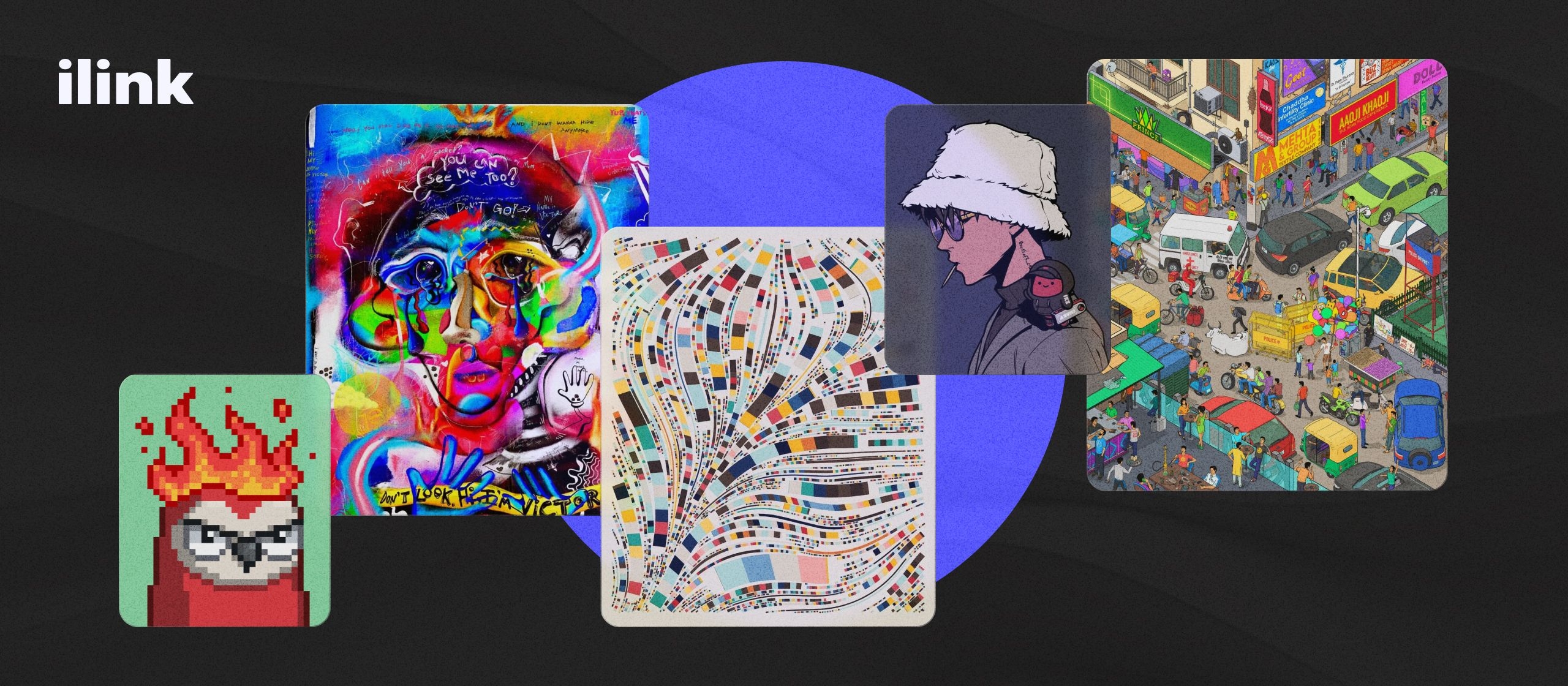Top Blockchains for Startups in Different Fields

Blockchain for Different Fields
Blockchain technology has become a transformative tool for startups, providing solutions that enhance transparency, security, and efficiency. Whether it's powering financial applications, streamlining supply chains, or enabling secure data sharing, blockchain has vast potential across industries. This article explores the top blockchain platforms tailored to startups in various fields.
What Makes a Blockchain Suitable for Startups?
Choosing the right blockchain is a crucial decision for startups, as it directly impacts the scalability, efficiency, and success of their project. Here are the key factors to consider, with specific examples to guide startups: 1. Scalability and Performance. The chosen blockchain must handle increasing transaction volumes as the startup grows. High throughput and low latency are essential for maintaining seamless user experiences.
Example: A fintech startup offering real-time payments may choose Stellar or Solana for their ability to process thousands of transactions per second efficiently.
2. Cost-Effectiveness. Startups often operate with limited budgets, so selecting a blockchain with low transaction fees and development costs is vital.
Example: Polygon, a layer-2 solution for Ethereum, offers reduced fees while maintaining compatibility with Ethereum’s robust ecosystem.
3. Flexibility and Customization. The blockchain should support the specific needs of the startup’s industry and application. Permissioned blockchains are ideal for industries requiring privacy, while public blockchains are better for open ecosystems.
Example: A supply chain startup might opt for Hyperledger Fabric, which allows modular architecture for industry-specific customization.
4. Security. Startups must ensure the blockchain’s network is resistant to attacks, ensuring data and transaction integrity. Security protocols like proof-of-work (PoW), proof-of-stake (PoS), and advanced cryptographic techniques are crucial.
Example: Healthcare startups dealing with sensitive patient data may prefer Guardtime, a blockchain known for its high-security standards in protecting critical data.
5. Development Tools and Ecosystem Support. An active developer community, detailed documentation, and support tools make it easier to build and deploy applications.
Example: Ethereum boasts one of the largest developer communities and extensive resources, making it ideal for DeFi startups.
6. Interoperability. The ability to connect and exchange data with other blockchains and legacy systems is essential for scaling and broadening reach.
Example: Polkadot enables startups to build interoperable blockchain applications, allowing them to interact seamlessly with other networks.
7. Speed of Development. Rapid prototyping and deployment are vital for startups looking to test and refine their ideas quickly.
Example: Startups in gaming often use Flow, which simplifies the development process for NFT marketplaces and games.
8. Regulatory Compliance. Some industries, like finance and healthcare, require adherence to strict regulations. The blockchain must facilitate compliance through auditable and transparent transactions.
Example: Corda is designed with financial institutions in mind, ensuring startups can meet KYC and AML requirements effortlessly.
9. Sustainability. Startups increasingly prefer eco-friendly blockchain solutions to align with environmental goals and attract conscious consumers.
Example: Algorand and Tezos are energy-efficient platforms, making them suitable for startups concerned with sustainability.
10. Future-Proofing and Upgradability. The blockchain should evolve to incorporate new technologies and updates without disrupting existing operations.
Example: Cardano is built on a research-driven approach, ensuring scalability and upgradability for long-term projects.
Take the next step toward success! Explore the possibilities of blockchain for your industry and unlock the potential of decentralized solutions. Get in touch with us today to discuss how we can help you choose and implement the perfect blockchain platform for your startup.
Key Areas Where Blockchain is Used
Financial Services
Blockchain has significantly disrupted the financial industry, providing startups with innovative ways to offer secure, efficient, and transparent solutions. Traditional financial systems often involve intermediaries, delays, and high fees. Blockchain eliminates these inefficiencies, enabling a new era of decentralized financial services.
Key Applications for Financial Startups:
- Decentralized finance (DeFi). Startups can build platforms for lending, borrowing, and trading without intermediaries, democratizing access to financial services.
- Cross-border payments. Blockchain facilitates faster and more affordable international transactions, reducing reliance on traditional banking systems.
- Smart contracts. Automating financial agreements, such as loans or insurance payouts, to reduce errors and costs.
- Asset tokenization. Startups can tokenize assets like real estate, commodities, or securities, enabling fractional ownership and liquidity.
- Remittances. Blockchain reduces fees and processing times for sending money across borders, especially for underserved populations.
Top Blockchain Platforms for Financial Startups:
- Ethereum. A go-to platform for building DeFi applications, offering a robust ecosystem of decentralized exchanges, lending platforms, and stablecoins.
- Ripple. Designed specifically for cross-border payments, Ripple’s low transaction fees and fast settlement times make it ideal for financial startups.
- Stellar. Focused on financial inclusion, Stellar facilitates micropayments and remittances in emerging markets.
- Corda. A permissioned blockchain for financial institutions, enabling secure and scalable private transactions.
Example Use Case. A startup uses Ethereum to create a decentralized lending platform where users can earn interest on cryptocurrency deposits without traditional banks.
Supply Chain Management
Supply chain inefficiencies, fraud, and lack of transparency are major challenges for businesses. Blockchain provides a decentralized ledger to track goods, verify authenticity, and streamline operations, making it a game-changer for supply chain startups.
Key Applications for Supply Chain Startups:
- Product traceability. Blockchain enables startups to track goods from origin to destination, ensuring authenticity and ethical sourcing.
- Smart contracts. Automating supply chain agreements like payments upon delivery, reducing disputes and delays.
- Inventory management. Real-time visibility into stock levels and shipments enhances decision-making and efficiency.
- Fraud prevention. Immutable records on the blockchain make it nearly impossible to tamper with transaction histories.
- Compliance. Ensuring adherence to regulatory requirements with transparent documentation.
Top Blockchain Platforms for Supply Chain Startups:
- Hyperledger Fabric. A permissioned blockchain that allows tailored solutions for private and secure supply chain networks.
- IBM blockchain. An enterprise-ready platform for building and managing complex supply chain systems with tools for tracking, auditing, and reporting.
- VeChain. A public blockchain designed specifically for supply chain solutions, with features like RFID integration and anti-counterfeiting measures.
- OriginTrail. Focused on supply chain data interoperability, helping startups connect fragmented data across suppliers and stakeholders.
Example Use Case. A logistics startup uses VeChain to track the temperature and location of perishable goods, ensuring quality and compliance during transit.
Healthcare
The healthcare industry faces critical challenges such as data breaches, fragmented systems, and inefficiencies in patient care. Blockchain provides secure, interoperable, and transparent solutions to these problems, offering startups a platform to innovate and build trust.
Key Applications for Healthcare Startups:
- Electronic Health Records (EHRs). Blockchain enables secure, decentralized storage of patient data, accessible only by authorized parties.
- Drug supply chain. Startups can track pharmaceuticals from production to delivery, combating counterfeit drugs and ensuring compliance.
- Clinical trials. Blockchain ensures the integrity of clinical trial data, reducing fraud and enhancing transparency.
- Telemedicine and remote care. Using blockchain for secure communication and data exchange between patients and providers.
- Insurance claims. Automating claims processing with smart contracts to reduce fraud and improve efficiency.
Top Blockchain Platforms for Healthcare Startups:
- Hyperledger Sawtooth. Ideal for managing healthcare workflows and ensuring interoperability among different healthcare systems.
- Ethereum. Supports the creation of decentralized health record systems and tokenized incentives for healthy behaviors.
- Solve.Care. A healthcare-specific blockchain designed to simplify patient-provider coordination, benefits administration, and payment processing.
- Guardtime. Specializes in blockchain-based cybersecurity solutions for protecting sensitive healthcare data.
Example Use Case. A health tech startup uses Hyperledger Sawtooth to create a platform where patients can securely share their health records with doctors and insurers, maintaining full control over access.
Real Estate
Blockchain simplifies property transactions by reducing intermediaries and improving transparency. Startups leverage blockchain for:
- Property tokenization. Fractional ownership through digital tokens.
- Title management. Securely storing and verifying property titles.
- Smart contracts. Automating rental agreements and property sales.
Top Blockchain Platforms for Real Estate Startups:
- Propy. A blockchain-based platform for seamless property transactions, title management, and cross-border real estate deals.
- Mina Protocol. Its lightweight blockchain ensures secure, private, and efficient real estate transactions.
Example. A real estate startup using Propy to facilitate international property purchases with minimal paperwork.
Energy
The energy industry is undergoing a significant transformation with the adoption of renewable energy sources, decentralized grids, and smarter energy management systems. Blockchain is playing a pivotal role in facilitating these changes by enabling transparency, security, and efficiency in energy transactions.
Key Applications for Energy Startups:
- Peer-to-peer energy trading. Allows consumers to trade surplus energy (e.g., solar power) directly with others in their community without intermediaries.
- Grid management. Blockchain enables real-time monitoring and management of decentralized energy grids, improving efficiency.
- Renewable energy certificates (RECs). Startups can issue and track certificates to verify the production and consumption of renewable energy.
- Carbon credit trading. Blockchain ensures transparency and accountability in carbon credit markets.
- Smart energy contracts. Automate billing, payments, and energy allocation based on pre-set agreements.
Top Blockchain Platforms for Energy Startups:
- Energy Web Chain. Specially designed for energy applications, supporting dApps focused on grid management, RECs, and decentralized energy systems.
- Power Ledger. Facilitates peer-to-peer energy trading, grid optimization, and renewable energy tracking.
- LO3 Energy. Focused on creating local energy marketplaces and community-based energy trading.
- IOTA. Known for its feeless transactions, IOTA is ideal for IoT-powered energy solutions like smart grids.
Example Use Case. A renewable energy startup uses Power Ledger to enable households to sell excess solar energy to their neighbors in a transparent and secure manner.
Identity Management
Identity management is a critical challenge in the digital age, with increasing concerns about data breaches, identity theft, and user privacy. Blockchain provides a decentralized, secure solution for managing and verifying digital identities.
Key Applications for Identity Management Startups:
- Self-sovereign identity. Users maintain full control over their personal data and share it selectively.
- KYC/AML compliance. Blockchain simplifies Know Your Customer (KYC) and Anti-Money Laundering (AML) processes by securely storing and verifying user data.
- Digital authentication. Passwordless logins and secure authentication mechanisms.
- Access control. Blockchain can manage the permissions for accessing systems, applications, and resources.
- Data monetization. Users can choose to monetize their data by sharing it with businesses on their terms.
Top Blockchain Platforms for Identity Management Startups:
- Civic. Provides decentralized identity verification and reusable KYC data for businesses and individuals.
- Hyperledger Indy. A specialized platform for self-sovereign identity systems, enabling secure and independent digital identities.
- uPort. Focused on self-sovereign identity and user-controlled data sharing.
- Ontology. Offers decentralized identity solutions integrated with business and financial ecosystems.
Example Use Case. A cybersecurity startup uses Hyperledger Indy to build a platform where users can verify their identity online without sharing sensitive personal information.
Gaming
The gaming industry is at the forefront of blockchain adoption, leveraging it for digital asset ownership, decentralized economies, and innovative monetization models. Blockchain empowers gamers and developers by providing transparency and control over in-game assets and rewards.
Key Applications for Gaming Startups:
- NFT-based games. Non-fungible tokens (NFTs) allow players to truly own in-game items, characters, and collectibles.
- Play-to-earn models. Gamers earn cryptocurrency or tokens by participating in gameplay, incentivizing engagement.
- Decentralized marketplaces. Facilitating peer-to-peer trading of in-game assets without intermediaries.
- Interoperability. Blockchain enables assets from one game to be used in another, creating cross-game economies.
- Fraud prevention. Transparent transactions ensure authenticity and reduce cheating in virtual economies.
Top Blockchain Platforms for Gaming Startups:
- Enjin. Designed for creating, managing, and integrating blockchain-based virtual goods and NFTs into games.
- Flow. A scalable platform optimized for gaming and digital collectibles, used by projects like NBA Top Shot.
- Immutable X. A layer-2 scaling solution for Ethereum, offering gas-free minting of NFTs and instant trading.
- Polygon. A highly scalable blockchain with low transaction fees, ideal for gaming applications.
Example Use Case. A gaming startup builds a play-to-earn RPG game on Flow where players earn NFTs as rewards, which can be traded in a decentralized marketplace.
Intellectual Property
Managing intellectual property (IP) has always been a challenge due to piracy, fraud, and the complexities of verifying ownership. Blockchain solves these issues by creating immutable records that verify the provenance and ownership of creative works.
Key Applications for Intellectual Property Startups:
- Ownership proof. Creators can register their works on the blockchain, establishing an immutable record of ownership.
- Royalty management. Smart contracts automate royalty payments, ensuring fair compensation for creators.
- Fraud prevention. Blockchain helps combat plagiarism and piracy by providing verifiable proof of authenticity.
- Data sharing and licensing. Blockchain ensures secure and transparent sharing of IP while enforcing licensing agreements.
- Crowdfunding and tokenization. Creators can tokenize their works, allowing supporters to invest in or own a share of their IP.
Top Blockchain Platforms for Intellectual Property Startups:
- Ocean Protocol. Focused on secure and transparent data sharing, making it suitable for IP monetization.
- Ascribe. Allows artists and creators to register, track, and protect their digital works on the blockchain.
- WAX. A blockchain platform for creating and trading digital collectibles, ideal for IP-based NFTs.
- Algorand. A scalable and secure blockchain for issuing and managing IP-related tokens and licenses.
Example Use Case. A digital art startup uses Ascribe to register and track the distribution of digital artworks, ensuring creators receive royalties whenever their works are resold.
Blockchain technology offers startups in diverse industries the tools to innovate and scale effectively. From financial services to gaming and beyond, selecting the right platform is key to unlocking the potential of blockchain. By aligning platform capabilities with business objectives, startups can harness blockchain to deliver impactful, future-ready solutions.
Comments (0)
Latest Posts

Understanding the mechanics of these platforms is crucial for anyone looking to participate in the world of NFT trading and digital ownership.

In this article, we will dive into the key roles in a blockchain development team, the necessary skills for each role, and the tools and methodologies that help these teams collaborate efficiently and deliver top-notch blockchain applications.
Do You Have any Questions?
Leave your details - we will contact you to answer all your questions

